Working on a farm can be risky, making it vital to protect your feet. Safety shoes are designed to keep your feet safe from injuries caused by heavy objects, sharp tools, and slippery surfaces. They also help you stay comfortable while working in tough conditions like mud and rain. Choosing the right safety shoes not only keeps you safe but also improves your overall work experience.
Key Takeaways
- Safety shoes are crucial for preventing foot injuries on farms.
- Look for shoes with non-slip soles to avoid falls in wet conditions.
- Reinforced toes protect against heavy objects that could drop on your feet.
- Water-repellent materials keep your feet dry in muddy or rainy conditions.
- A good fit and comfort are essential for long hours of work.
Understanding the Risks in Agriculture
Agriculture is a vital industry, but it comes with many dangers that can harm workers. Understanding these risks is the first step in staying safe on the job. Here are some common hazards:
Common Hazards on Farms
- Uneven terrain: Fields can be bumpy and hard to walk on.
- Heavy machinery: Tractors and other equipment can cause serious injuries if not handled properly.
- Sharp tools: Items like shovels and pitchforks can lead to cuts or punctures.
- Chemical exposure: Pesticides and fertilizers can be harmful if not used correctly.
- Animal behavior: Livestock can be unpredictable and may cause injuries.
Impact of Terrain on Foot Safety
The ground on farms is often uneven and can be slippery, especially when wet. This can lead to:
- Twisted ankles
- Falls
- Injuries from sharp objects
Role of Safety Shoes in Risk Mitigation
Wearing the right safety shoes is crucial for protecting your feet. Here’s how they help:
- Protection from heavy objects: Safety shoes can prevent injuries from items that might fall.
- Prevent punctures: They can shield your feet from sharp tools and debris.
- Reduce slips: Non-slip soles help keep you steady on wet or muddy ground.
Proper footwear is essential for anyone working in agriculture. It not only protects your feet but also helps you work more efficiently and safely.
Key Features of Safety Shoes for Agriculture
Importance of Non-Slip Soles
Safety shoes must have non-slip soles to prevent accidents on wet or muddy surfaces. These soles are designed to provide excellent grip, which is crucial when navigating uneven terrain. Here are some key points about non-slip soles:
- They help reduce the risk of slips and falls.
- Look for shoes with SRA, SRB, or SRC ratings for better slip resistance.
- Ensure the sole material is suitable for outdoor conditions.
Reinforced Toes for Protection
A reinforced toe is essential for safety shoes, as it protects your feet from heavy objects that might fall. The steel toe cap is a common feature that provides maximum protection against crushing injuries. Here’s why reinforced toes are important:
- They shield your toes from impact.
- They are often required by safety regulations.
- They enhance the durability of the shoe.
Water-Repellent Materials
Choosing shoes made from water-repellent materials is vital for farmers. These materials keep your feet dry in wet conditions, which is essential for comfort and health. Consider the following:
- Water-repellent shoes help prevent fungal infections.
- They are lightweight and breathable, making them suitable for summer.
- Look for shoes that also allow sweat to escape.
Breathability and Comfort
Comfort is key when working long hours on a farm. Shoes that are breathable help keep your feet cool and dry. Here are some features to look for:
- Shoes with mesh panels for airflow.
- Cushioned insoles for added comfort.
- Arch support to reduce fatigue during long hours of work.
Proper footwear is not just about safety; it’s about comfort and health too. Choosing the right safety shoes can make a significant difference in your daily work experience.
Choosing the Right Safety Shoes for Different Seasons
When it comes to working on a farm, selecting the right safety shoes for different seasons is crucial. The right footwear can make a big difference in comfort and safety. Here’s a breakdown of what to consider for each season:
Footwear for Summer Conditions
- Lightweight and breathable shoes are essential to keep your feet cool.
- Look for water-repellent materials to protect against unexpected rain.
- Non-slip soles are a must to prevent slips on wet surfaces.
Winter Safety Shoe Requirements
- Choose heat-insulating footwear to keep your feet warm in cold conditions.
- Ensure the shoes have a good grip to handle icy or muddy terrain.
- Waterproof options are important to keep your feet dry from snow and slush.
All-Season Footwear Options
- Opt for shoes that are durable and easy to maintain to withstand various weather conditions.
- Consider models that offer both breathability and insulation for year-round comfort.
- Look for features like reinforced toes and puncture resistance for added safety.
| Feature | Summer Shoes | Winter Shoes | All-Season Shoes |
| Weight | Lightweight | Heavier for insulation | Balanced |
| Breathability | High | Low | Moderate |
| Waterproofing | Water-repellent | Fully waterproof | Water-resistant |
| Insulation | None | High | Moderate |
Choosing the right safety shoes is not just about comfort; it’s about protecting your feet from potential hazards on the farm.
In summary, whether you need summer safety work shoes for men or women’s Nike shoes for working out, always prioritize features that suit the season and the specific challenges of your work environment. This will ensure your feet stay safe and comfortable all year round!
Proper Fit and Maintenance of Safety Shoes
Ensuring the Right Fit
Finding the right fit for your safety shoes is essential. A proper fit can prevent discomfort and injuries. Here are some tips to ensure your shoes fit well:
- Check the toe room: Make sure there’s enough space for your toes to move comfortably.
- Heel snugness: The heel should fit snugly without slipping.
- Try them on with socks: Wear the socks you plan to use with your shoes to get an accurate fit.
Tips for Maintaining Safety Shoes
To keep your safety shoes in good condition, follow these maintenance tips:
- Clean regularly: Remove dirt and mud after each use to prevent damage.
- Dry properly: If they get wet, let them air dry away from direct heat.
- Inspect for damage: Regularly check for wear and tear, especially on the soles and toe areas.
When to Replace Your Footwear
Knowing when to replace your safety shoes is crucial for foot safety. Here are signs that it’s time for a new pair:
- Visible wear: If the soles are worn down or cracked.
- Loss of support: If you feel less support than when they were new.
- Persistent discomfort: If you experience pain or discomfort after wearing them.
Remember, wearing the right safety shoes, like vans work shoes non slip, can significantly reduce the risk of injuries on the farm. Proper fit and maintenance are key to ensuring your feet stay protected every day!
The Role of Safety Shoes in Preventing Injuries
Protection Against Punctures
Safety shoes are designed to protect your feet from sharp objects that can cause puncture wounds. This is especially important on farms where tools, nails, and other sharp items are often found on the ground. Wearing the right shoes can prevent serious injuries.
Preventing Crush Injuries
Heavy equipment and livestock can pose a risk of crush injuries. Safety shoes with reinforced toes help shield your feet from heavy objects that might fall or be dropped. This feature is crucial for anyone working in close proximity to machinery or animals.
Reducing Slip and Fall Accidents
Farms can be slippery due to mud, water, or other substances. Non-slip soles on safety shoes provide better traction, helping to prevent slips and falls. Here are some key benefits of wearing safety shoes:
- Enhanced grip on wet surfaces
- Stability while walking on uneven terrain
- Support to reduce fatigue during long hours of work
Proper footwear is not just a choice; it’s a necessity for safety and health in agricultural field operations. Effective safety and health training and programs are important at agricultural worksites to protect farm workers from injuries and illnesses.
Standards and Regulations for Safety Shoes in Agriculture
Understanding Safety Categories
In agriculture, safety shoes must meet specific safety standards to protect workers effectively. The most common categories include:
- S2: Water-resistant shoes with basic protection.
- S3: Water-repellent shoes with an anti-puncture foil, ideal for outdoor work.
- EN 20346: Defines requirements for protective footwear, offering a lower degree of protection than EN 20345, with an impact resistance of 100 joules.
Compliance with Safety Standards
It’s crucial for employers to ensure that safety footwear complies with established standards. This includes:
- Checking for ANSI/ISEA or ASTM designations on footwear.
- Ensuring that shoes are suitable for the specific hazards present on the farm.
- Regularly reviewing and updating safety equipment to meet current regulations.
Importance of Certification
Certification of safety shoes is vital for ensuring their effectiveness. Certified footwear:
- Provides assurance of quality and durability.
- Reduces the risk of foot injuries in hazardous environments.
- Is often a requirement for compliance with workplace safety regulations.
Properly certified safety shoes are not just a recommendation; they are a necessity for protecting farm workers from potential injuries.
Additional Tips for Enhancing Foot Safety on Farms
Using Insoles for Extra Comfort
Insoles can make a big difference in how your feet feel after a long day. They provide extra cushioning and support, which can help reduce fatigue. Consider using insoles that are designed for work boots to enhance comfort and support.
Pairing Safety Shoes with Proper Socks
Wearing the right socks is just as important as choosing the right shoes. Here are some tips:
- Choose moisture-wicking socks to keep your feet dry.
- Look for socks with cushioning to add comfort.
- Avoid cotton socks, as they can trap moisture and lead to blisters.
Regular Foot Health Check-Ups
Taking care of your feet is essential, especially if you spend long hours on them. Schedule regular check-ups to catch any issues early.
Regular foot health check-ups can help prevent serious problems down the line.
Summary
By following these tips, you can help prevent slips, trips and falls in agriculture. Proper footwear with good tread is a valuable form of personal protective equipment (PPE). Worn-out tread offers no traction, so always check your shoes before heading out to work.
Taking these extra steps can significantly enhance your foot safety on the farm!
Conclusion
In conclusion, wearing safety shoes on the farm is not just a good idea; it’s a must. These shoes protect your feet from many dangers, like heavy objects, sharp tools, and slippery surfaces. By choosing the right footwear, you can avoid injuries and work more safely. Remember, your feet are important, and taking care of them with proper shoes helps you stay safe while doing your job. So, make sure to invest in quality safety shoes and keep your feet protected every day.
Frequently Asked Questions
Why are safety shoes important in agriculture?
Safety shoes are crucial in agriculture because they protect your feet from heavy items, sharp tools, and slippery surfaces, reducing the risk of injuries.
What features should I look for in safety shoes?
Look for safety shoes with non-slip soles, reinforced toes, and waterproof materials to ensure protection and comfort.
How do I choose the right safety shoes for different weather?
For summer, choose lightweight and breathable shoes. In winter, go for insulated and waterproof options to keep your feet warm and dry.
How can I tell if my safety shoes fit properly?
Your safety shoes should feel snug but not tight. There should be enough room for your toes to move without feeling cramped.
When should I replace my safety shoes?
Replace your safety shoes if they show signs of wear, such as cracks, holes, or if they no longer fit well.
What can I do to keep my feet safe while working on a farm?
Besides wearing safety shoes, use insoles for comfort, wear the right socks, and have regular foot health check-ups.
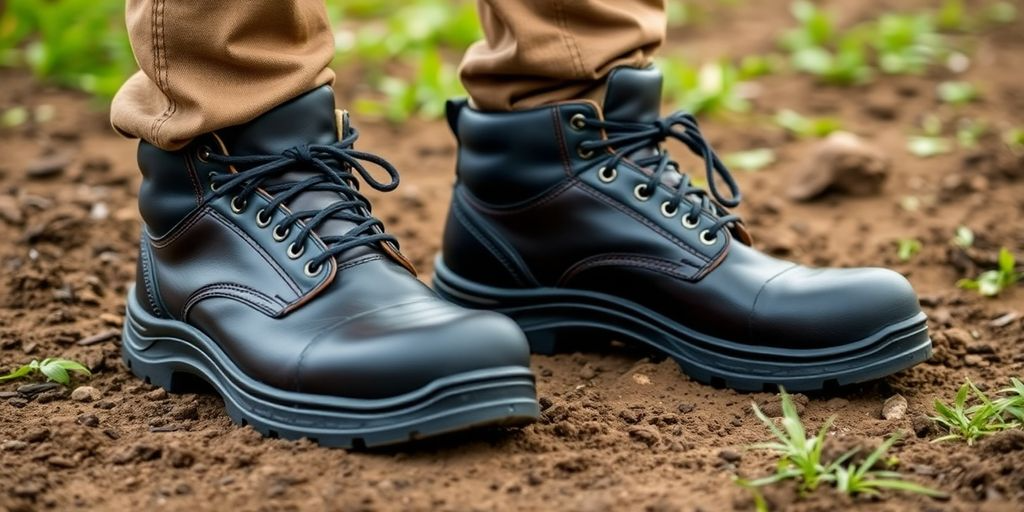
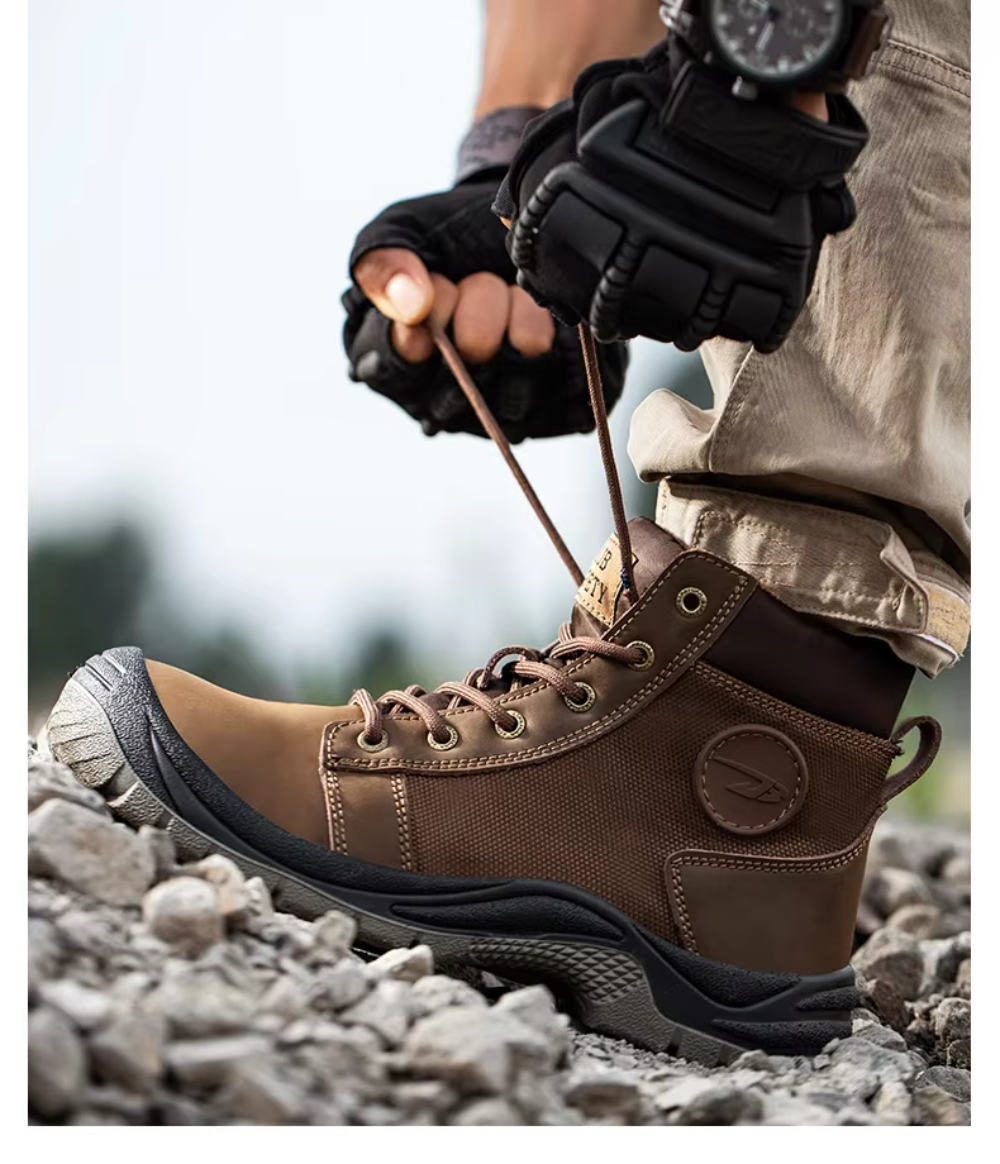


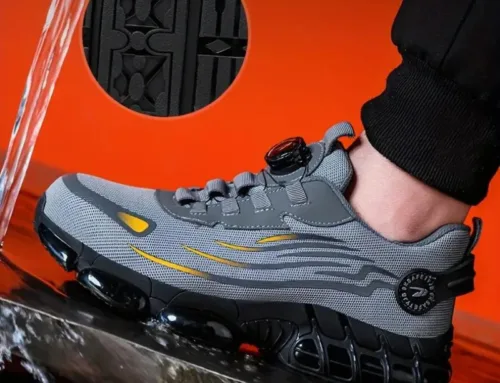
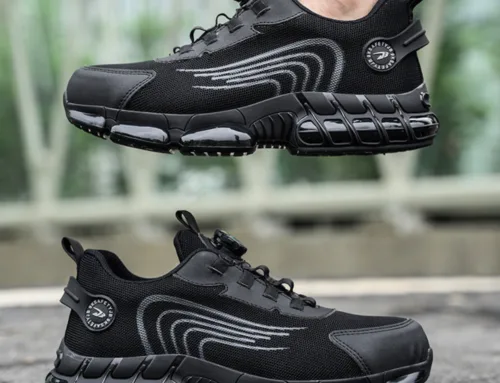
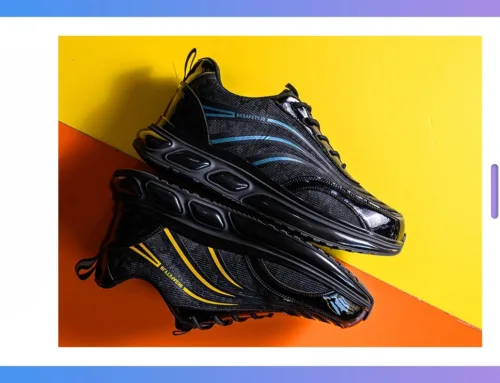
Leave A Comment